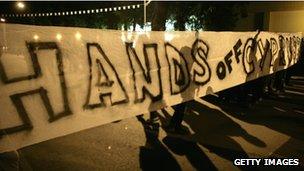The rescue of Cyprus won't feel like one to its people
- Published
- comments

Although eurozone governments and the International Monetary Fund have rescued Cyprus, it probably won't feel like much of a rescue.
The second largest bank, Laiki, is being closed. Losses from its closure, which will be substantial - billions of euros - will be absorbed by holders of its bonds and those with deposits over 100,000 euros ($130,000; £85,000).
So at a stroke, one important source of credit to the economy will be eliminated.
There is some relief for those with savings of 100,000 euros or less, because their cash will be transferred to the Bank of Cyprus, the country's biggest bank, and kept intact.
But Bank of Cyprus too is being reconstructed. And the costs of making sure it has enough capital to operate safely in the future will also fall on its deposits greater than 100,000 euros. So these depositors too will incur losses running to billions of euros.
In the many months it will take to rehabilitate Bank of Cyprus, the prospects of it providing adequate credit to households and businesses are slim indeed.
Meanwhile, foreign banks operating in Cyprus will probably head for the hills, knowing that an economy already in recession will probably now contract at a rate of knots - causing penury to many.
So, in summary, getting any kind of conventional loan in Cyprus over the next year may be almost impossible.
In the long term as well, prospects for this economy will be extremely challenging: the country's important offshore banking industry, the business of looking after the tax-escaping cash of Russian businesses and individuals, is in effect being closed down forever. All those losses being heaped on large depositors are reason enough for anyone with a choice about where to place their cash to stay away from Cyprus forever.
So here is the Cyprus "rescue" in a nutshell:
- An economy that will be starved of credit, and will therefore shrink rapidly and very painfully for citizens
- An economy whose main industry, offshore banking, is being shut.
Although there may be some relief that smaller savings no longer face a 6.7% levy, Cypriot citizens may over time end up feeling more than 6.7% poorer as a result of this so-called bailout.
The price for Cyprus of staying in the eurozone will be as great as for the people of any of the currency union's over-indebted nations.
What should give the eurozone's leaders some pause for thought is that at some point the people of countries in financial difficulty may begin to wonder whether they are right to be paying this steep bill to preserve the euro.
UPDATE 15:55 GMT
Although the European Commission says such restrictions must be temporary, such a staunching of capital flows would breach the fundamental rules of the EU, and is anathema to investors.
Being told that you can't have your money as and when you want it represents an appalling nightmare for the institutions and individuals who control the world's biggest pools of wealth.
The risk for the eurozone is that this cessation of the free movement of money across borders is seen as a precedent - and therefore nervous investors and lenders would pull their money out of other economies and banking systems perceived to be weak, such as those of Italy and Spain.
That would exacerbate the recessions in those economies, weaken their banks and further undermine the cohesion and integrity of the Eurozone. Talking to central bankers and regulators, what they're all most worried about is the imposition by Cyprus of capital controls, or restrictions on money leaving the country.